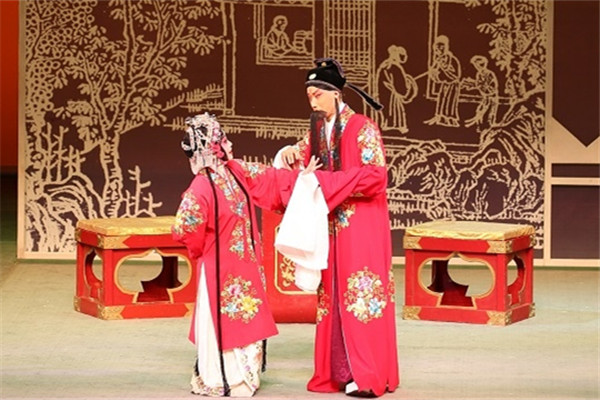Long before becoming China’s first UNESCO World Intangible Cultural Heritage, Kunqu Opera was already a celebrated artform in China. This year, the art form is celebrating the 400th anniversary of the death of the great Chinese playwright Tang Xianzu. Here in Beijing, the Shanghai Kunqu Opera Troupe began its world tour over the weekend with Tang’s “Handan Dream,” also known as “Four Dreams in the Camellia Hall.”
The down-and-out scholar Lu Sheng dreams of a life of fortune, power and women. An immortal grants his wishes through a dream where be comes a high-ranking official, marries into a wealthy family and wins the first place in the imperial exam by means of bribery.

In Beijing, the Shanghai Kunqu Opera Troupe kicked off their world tour over the weekend with Tang's "Handan Dream" -- also known as "Four Dreams in the Camellia Hall".
The drama fleshes out the seamy side of high ranks in the feudal society. Leading actor Lan Tian says it is really challenging to play a role that spans 50 years.
“My voice is kind of sharp and it took me a long time to figure out how to play Lu Sheng as an 80-year-old man. Another thing is that playing ‘Lu Sheng’ doesn’t need to have big circular movements like we usually do in other Chinese operas. Like this. (playing a line) It looks indecent, but that goes with the character. My teacher says I am Lu Sheng when I play him pathetic,” he said.
Handan Dream is one of Tang Xianzu’s four classical plays, which also include the Peony Pavilion, the best known and the most staged. Aside from Kunqu opera, these stories are also widely adapted into a variety of Chinese folk operas today.
Kunqu Opera is one of the oldest surviving forms of Chinese opera, dating back more than 600 years. It was listed by the UNESCO as a Masterpiece of Oral and Intangible Heritage in 2001. Since then, Kunqu Opera has gained an increasing popularity in the country, even surprassing Peking Opera.
Kunqu is the oldest folk opera in China. Known for its grace, beauty and delicacy, it dominated the country’s theater scene for almost 300 years, until Peking Opera took over in the late 1800s.
Like all traditional forms, Kunqu suffered setbacks under the influx of Western culture and new theatrical forms in China, but its fans are hopeful about the art form.
“I don’t think Kunqu operas will lose its fanbase. It’s the origin of all Chinese operas. The music, costume and performance are all so exquisite. I’m very much enamored with the Kunqu and I would come to watch the show whenever there is one. I also encourage my child to get to know more about the Kunqu opera,” said Liu Kaiyan, an audience member.
Today, Kunqu survives mainly in East China's coastal areas. Its vocal and performance style, as well as some traditional repertoires, are shared by Wuju Opera. Also, a few acrobatic stunts of Wuju Opera have recently been included in Kunqu Opera.















